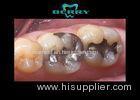

Distinguished Biocompatible Tough Palladium-Silver Alloy Porcelain Inlays And Onlays
| Place of Origin: | Zhejiang |
|---|
Company Profile
| Location: | Shenzhen, Guangdong, China (Mainland) |
|---|---|
| Business Type: | Manufacturer |
Product Description
Dental inlays is different from crowns and fillings.
A crown covers the entire top and sides of a tooth, where inlays and onlays cover only a small portion of the tooth.
The advantage is that more of the natural tooth is preserved with the process so that the structure of the tooth remains intact and very strong.
Additionally, inlays and onlays can be constructed so precisely that they leave no space between the prosthetic and the tooth where harmful bacteria could enter. This makes the inlays and onlays a better choice in most cases than metal fillings that require removing large parts of the tooth and that are not as resistant to damage and infection.
The actual process for installing inlays and onlays starts by cleaning the tooth. Should any odd or unstable areas be present, then the area for the prosthetic is sculpted so that the inlay or onlay will fit better. A mold is then taken of the tooth. If the damage is only present on the top or bite surface of the tooth, an inlay is prepared. Should the damage extend over the cusp to the sides of the tooth then an onlay is made. The mold is sent to a laboratory where the actual piece is manufactured and then sent back to the dentist.
The final step involves attaching the Inlay to the cleaned and prepared tooth with strong dental cement. There is very little recovery time after the procedure, and the repaired tooth can last for many years or even decades with proper care.

